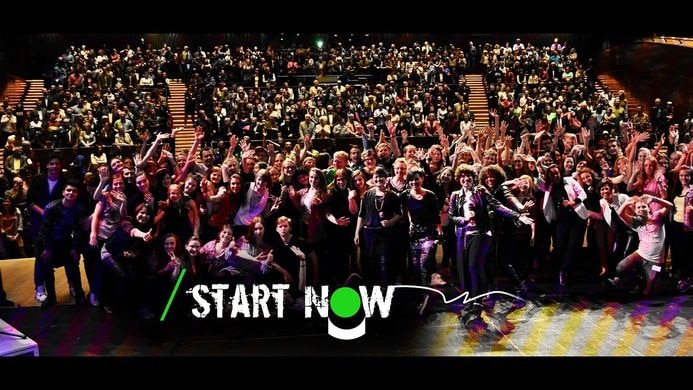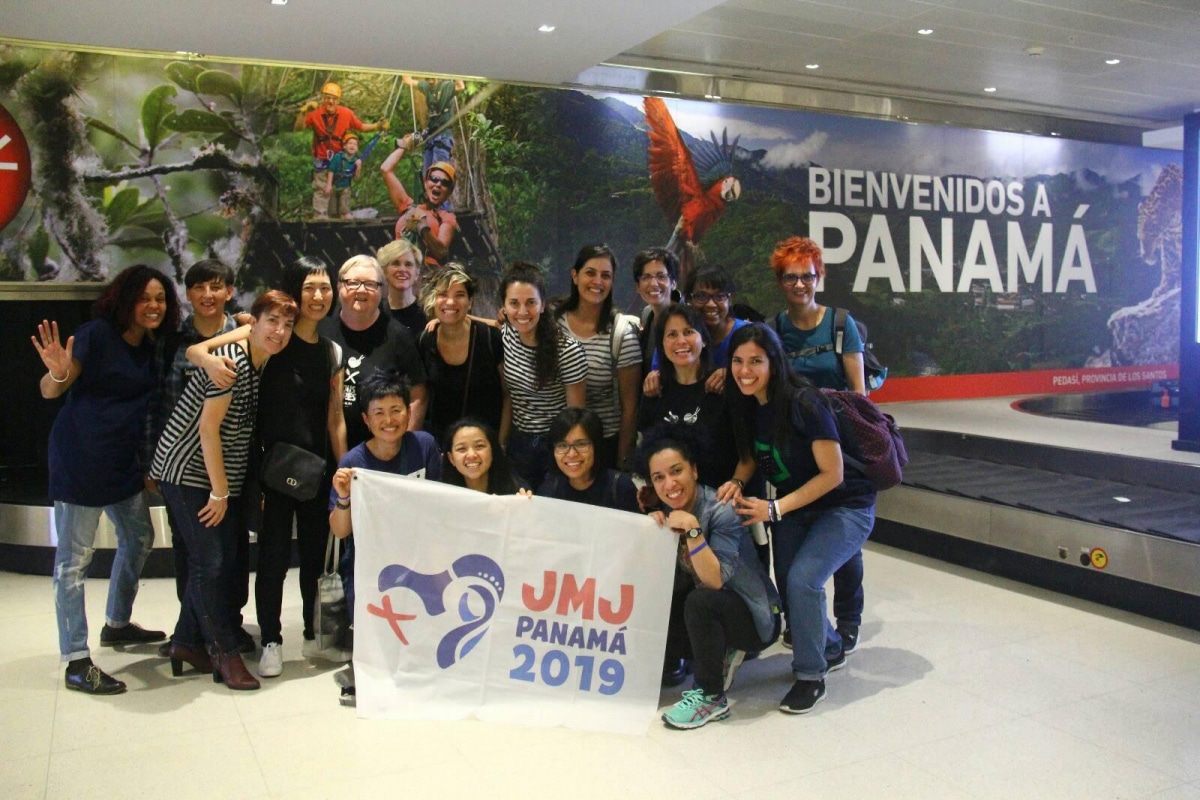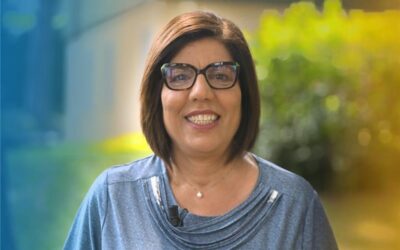Members of the music group share their experience of visiting Great Britain, Luxembourg and then Panama for the World Youth Day. They are now on tour in Cuba, Guatemala and El Salvador. Your most recent album “From the inside outside” expresses a very positive attitude towards other people. It seems to be saying that everyone can find a light within themselves which can be shared with others. Is that right?  Adriana: Nowadays we often hear that society is passing through a cultural night, so to speak, and that “darkness” and division are very evident. We want the message of this album to be an invitation to draw out and rekindle the hope that is often hidden beneath ashes inside many of us. The album has evolved from the experiences we have had with thousands of young people during our tours. Thanks to the “Start Now” project which consists of a series of workshops and a final concert, we have the opportunity to live in close contact with the new generations. We are aware of the challenges that they face but also of the fact that they are wonderful people. Sometimes we share our experience with them but not as adults who have worked out all the answers. Often we look at the challenges with them, try to face up to them and to find a solution. They often say, “Nothing will have changed when I go back home but I will deal with the situation in a different way.” Do you think that music, singing and dance are means of relating to young people? Sally: This is a particular characteristic of performing arts: they create dialogue and openness. The results are often really surprising. In a school where we were running a project, there was a student who suffered from selective mutism; that is, she had decided not to speak any more. When she signed up for the singing workshop we really wondered what she would do. The first day she didn’t open her mouth at all, the second day she just thanked us but the third day she offered to sing a harmony. She went home and, in tears, told her mother that she had found her voice again. The teachers were really moved and said, “This is really unbelievable. She always used to be on her own and now she is beginning to speak to other students…..” This is just one example; there would be so many more to share. The song “Not in my name” focuses on the relationship between Muslims and Christians. How did that begin? Adriana: We wanted to show solidarity with our Muslim friends and emphasise the values that we have in common. We knew that many of them were suffering because a mistaken image of Islam was becoming widespread and because the very heart of their religion is different from what was being portrayed in the media. The actual process of creating the song was an experience of dialogue. We were inspired by the words of Doctor Mohammad Ali Shomali, Director of the International Institute for Islamic Studies in Qum, Iran, who we had met in Loppiano. He had said that we are all like little drops that reflect the face of God and that together we can be an ocean of love. When he read the words of the song, he said that he felt totally expressed by them. We worked with Rassim Bouaballah, a Muslim member of the Focolare in the musical arrangement. He played the violin for the recording.
Adriana: Nowadays we often hear that society is passing through a cultural night, so to speak, and that “darkness” and division are very evident. We want the message of this album to be an invitation to draw out and rekindle the hope that is often hidden beneath ashes inside many of us. The album has evolved from the experiences we have had with thousands of young people during our tours. Thanks to the “Start Now” project which consists of a series of workshops and a final concert, we have the opportunity to live in close contact with the new generations. We are aware of the challenges that they face but also of the fact that they are wonderful people. Sometimes we share our experience with them but not as adults who have worked out all the answers. Often we look at the challenges with them, try to face up to them and to find a solution. They often say, “Nothing will have changed when I go back home but I will deal with the situation in a different way.” Do you think that music, singing and dance are means of relating to young people? Sally: This is a particular characteristic of performing arts: they create dialogue and openness. The results are often really surprising. In a school where we were running a project, there was a student who suffered from selective mutism; that is, she had decided not to speak any more. When she signed up for the singing workshop we really wondered what she would do. The first day she didn’t open her mouth at all, the second day she just thanked us but the third day she offered to sing a harmony. She went home and, in tears, told her mother that she had found her voice again. The teachers were really moved and said, “This is really unbelievable. She always used to be on her own and now she is beginning to speak to other students…..” This is just one example; there would be so many more to share. The song “Not in my name” focuses on the relationship between Muslims and Christians. How did that begin? Adriana: We wanted to show solidarity with our Muslim friends and emphasise the values that we have in common. We knew that many of them were suffering because a mistaken image of Islam was becoming widespread and because the very heart of their religion is different from what was being portrayed in the media. The actual process of creating the song was an experience of dialogue. We were inspired by the words of Doctor Mohammad Ali Shomali, Director of the International Institute for Islamic Studies in Qum, Iran, who we had met in Loppiano. He had said that we are all like little drops that reflect the face of God and that together we can be an ocean of love. When he read the words of the song, he said that he felt totally expressed by them. We worked with Rassim Bouaballah, a Muslim member of the Focolare in the musical arrangement. He played the violin for the recording.  Now you are in Central America and have taken part in the World Youth Day. How is this trip going? Alessandra: In Panama, in the cities of Chitre and Colon, we worked with young people to hold concerts for the thousands of pilgrims at the World Youth Day. Being on stage with these young people made us both experience and say to others that together we can hope. We also had an unforgettable experience at the Women’s Prison in Panama City. Life is very difficult for these women but they listened so attentively: they often applauded spontaneously and cried when they heard the songs. At the end, many of them told us that they felt that it was as if we had all experienced the same things; they felt that together we can begin again and look to the future even in a place where this could seem impossible. It was seeing that God’s mercy can work in our lives irrespective of the circumstances.
Now you are in Central America and have taken part in the World Youth Day. How is this trip going? Alessandra: In Panama, in the cities of Chitre and Colon, we worked with young people to hold concerts for the thousands of pilgrims at the World Youth Day. Being on stage with these young people made us both experience and say to others that together we can hope. We also had an unforgettable experience at the Women’s Prison in Panama City. Life is very difficult for these women but they listened so attentively: they often applauded spontaneously and cried when they heard the songs. At the end, many of them told us that they felt that it was as if we had all experienced the same things; they felt that together we can begin again and look to the future even in a place where this could seem impossible. It was seeing that God’s mercy can work in our lives irrespective of the circumstances.
a cura di Anna Lisa Innocenti




0 Comments